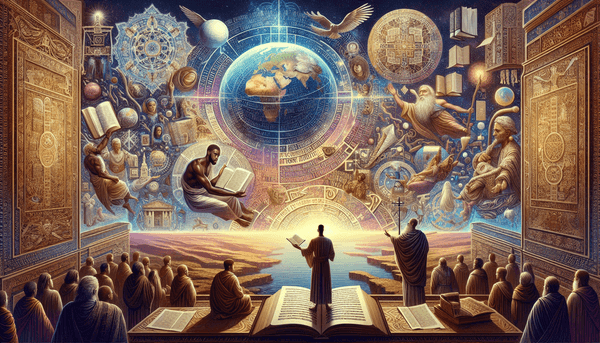The Treatment of God's Creation
In the quest to understand the sanctity of life, the Bible provides guidance on how we should treat God's creation. The wisdom of Proverbs 12:10 highlights that 'The righteous care for the needs of their animals,' indicating a broader call to treat all living creatures with respect and kindness. This biblical ethos extends to the smallest of God's creatures, including bees. The act of killing bees, then, becomes a matter of moral consideration, prompting us to reflect on our actions' impact on the environment and the interconnected web of life. The Genesis mandate (Genesis 1:28) to steward the Earth responsibly, Psalm 24:1's reminder that 'The Earth is the Lord's,' and Jesus' affirmation of the value of birds in Matthew 6:26 all reinforce our duty to care for creation, resonating with the Pauline vision in Romans 8:19-22, where creation awaits redemption from its suffering.
Mary as the Mother of God
Mary, a central figure in Christianity, holds the profound title of the Mother of God. This designation is rooted in the biblical narrative, where the angel Gabriel announces to Mary, 'You will conceive and give birth to a son, and you are to call him Jesus. He will be great and will be called the Son of the Most High' (Luke 1:31-32). This divine motherhood is not just a biological fact but a theological truth that speaks to the mystery of the incarnation. John 1:14 describes how 'The Word became flesh and made his dwelling among us,' underscoring Mary's role in God's plan of salvation. Furthermore, the 'Immanuel' prophecy (Matthew 1:23), Elizabeth's greeting (Luke 1:42-43), and the apostle Paul's reference to God's Son being born of a woman (Galatians 4:4) all contribute to a rich tapestry of scriptural affirmations of Mary's unique and honored position.
The Book of Enoch
The Book of Enoch remains an enigmatic work, historically significant yet residing outside the canonical scriptures. This collection of apocalyptic writings, attributed to the ancient figure Enoch, is referenced in Jude 1:14-15, hinting at its influence on early Christian thought. While Enoch's writings are not authoritative for faith and practice in most Christian denominations, they offer a glimpse into the diverse religious landscape of the Second Temple period. The book's exclusion from the Bible is linked to its theological and historical context, which did not align with the established canon. Nonetheless, the legacy of Enoch, the man who 'walked faithfully with God and was no more, because God took him away' (Genesis 5:24), resonates through the reference in Hebrews 11:5, which celebrates his righteousness and translation to heaven without experiencing death—a testament to his profound faith. For further exploration of faith's role in navigating life's challenges, consider the insights provided at The Bible Chat.
Conclusion
Our exploration of these biblical themes and theological concepts serves as a reminder of the depth and richness found within scripture. From the practical stewardship of creation to the profound mysteries of divine motherhood and ancient texts, the Bible continues to offer wisdom and guidance for our contemporary world. In much the same way, further discussions on biblical perspectives can deepen our understanding of relationships, personal preferences, and moral complexities. The figure of Enoch and the diverse understandings of God across faith traditions challenge us to think deeply about our beliefs and how we express them in our daily lives. As we conclude, we are encouraged to pursue further study and dialogue, recognizing that the pursuit of knowledge and understanding is a lifelong journey that enriches our faith and deepens our connection with the divine.
FAQ
Q: Is killing bees a sin?
A: The Bible does not specifically address the issue of killing bees, but it does provide guidance on how we should treat God's creation. In Proverbs 12:10, it says, 'The righteous care for the needs of their animals, but the kindest acts of the wicked are cruel.' This verse encourages us to treat animals and by extension, all of God's creation, with care and compassion. While it does not directly mention bees, it reminds us of our responsibility to treat all living creatures with respect and kindness.
Q: Is Mary the mother of God?
A: Yes, according to the Bible, Mary is recognized as the mother of Jesus, who is both fully human and fully divine. In the Gospel of Luke, when the angel Gabriel appeared to Mary, he said, 'You will conceive and give birth to a son, and you are to call him Jesus. He will be great and will be called the Son of the Most High' (Luke 1:31-32). This affirms the belief that Mary is the mother of Jesus, who is both human and divine, and therefore she is often referred to as the 'Mother of God' in Christian theology.
Q: What happened to the book of Enoch?
A: The book of Enoch is not included in the canonical Bible that is widely recognized by most Christian traditions. It is considered part of the apocryphal or pseudepigraphal writings. These texts were not included in the official canon of scripture, but are still of interest to many for historical and cultural reasons. The book of Enoch contains various writings attributed to Enoch, an ancient biblical figure, and is considered significant in some non-canonical traditions. However, its exclusion from the Bible means it is not considered authoritative for matters of faith and practice by most Christian denominations.
Q: In Christianity, is the term 'God' the same as 'Allah'?
A: In Christianity, the term 'God' refers specifically to the God revealed in the Bible, who is understood as the creator of the universe and the one true God. The term 'Allah' is the Arabic word for God and is used by Arabic-speaking Christians and Jews, as well as by Muslims. It's important to note that while Christians and Muslims both worship a monotheistic deity, there are significant differences in the understanding of the nature and character of God between the two faiths. Christians believe in the Trinity – one God in three persons: Father, Son (Jesus Christ), and Holy Spirit. This concept of the Trinity is not present in Islam.






